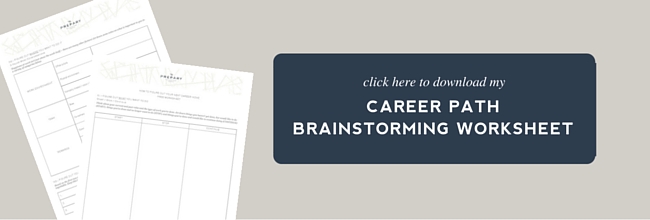I’ve met hundreds of job seekers over the course of the last few years and many of them come to me with the same problem:
They know it’s time to make a career move, but they’re not sure what it should be.
Some people absolutely hate what they’re doing and are looking for a complete shift and others just need a change of scenery. Whichever camp you’re in, this two part series is going to help you figure out your next career move.
If I had a magic assessment where you could answer 100 questions and your ideal profession would pop right up, I think I’d be rich.
The bad news — it’s going to take a lot more heavy lifting than that. The good news — I bet you already know what you actually want. The key is being honest with yourself and actually putting that knowledge into action.
Let’s break it down into 3 steps with 3 exercises. I also created a free worksheet which you can download below and fill out as you read along.
#1 – Figure out WHAT you want to do
The first thing to consider if the job itself. What types of tasks (functionally) do you want to be doing on a daily basis? What gives you energy and makes you excited? What will help you grow in your career?
For some, this will be constantly interacting with people. For others, this could be writing code or analyzing data… or managing large projects from start to finish.
The list could go on forever, but the way you know what gives you the most energy is to draw on your existing experiences and learn about new areas of interest.
Exercise #1 – Start/Stop/Continue
Using the worksheet you downloaded above or even a chart you draw on the back of a napkin, take notes in 3 separate columns.
In the start column, jot down things you haven’t done yet, but are interested in doing or at least learning more about.
In the stop column (this is always an easy one) jot down things you’ve done that you don’t particularly like or want to continue doing.
In the continue column, jot down things you’ve done in the past or are currently doing that you enjoy and are good at.
Write from your gut, without overthinking it. Most people who I share this exercise with find that it’s not only easy to do, but actually really illuminating.
#2 – Figure out WHERE you want to do it
Now, I think we all know that you could have the greatest job in the world from a functional perspective but if you hate your boss, or work in a negative environment, or aren’t rewarded properly, you’re still going to be unhappy.
Environment, culture, people, and so many other factors are JUST as important to consider as the type of job you want.
Exercise #2 – Read through the below categories and use your worksheet to take notes on what you’re looking for within each bucket
Work Environment:
Consider what type of work environment you thrive in. Is it quiet or energetic, casual or formal, a little nuts or fairly predictable? Think about things like dress code, the office vibe, and even how the actual desks are set up (closed offices/cubicles or totally open).
All of these things come together to shape a work environment or office culture, and one size does not fit all.
Team:
Your team is made up of your direct boss, direct reports (if you are a people manger), team leaders, peers/co-workers, and cross-functional partners. Basically, anyone you interact with on a daily basis can have a huge impact on your happiness.
Think about the type of people you work best with and while you’re interviewing, pay close attention to the people you speak with. You can learn a lot about your future team by asking thoughtful questions.
I’m always surprised by how honest people will be about their expectations and work styles during the interview process. If you notice a red flag, don’t discount it. Again, pay attention to your gut.
Rewards/Perks/Life Benefits:
This bucket is also important. In addition to working in a great environment with a great team, you still have to feel appreciated, rewarded, and most importantly, able to live your life outside of work.
Of course base compensation is important, but I’d encourage you to also think about things like commute, flexibility, discounts, benefits, time off, and anything else that might be important to you.
Remember, there are no right or wrong answers here – it’s really about knowing yourself and knowing what’s right for YOU.
#3 Figure out your non-negotiables:
Like buying a house, you’re never going to get everything on your wish list. This means you’re going to have to prioritize.
Exercise #3 – List your top 3 career priorities
So for this next exercise, pick your top 3 priorities in this job search.
- Is it taking the next step in your career, getting more responsibility, and growing in scope or title?
- Is it making a career change where you might need to take a title or salary cut to be able to do something you love and get on a new path?
- Is it simply getting more money but maybe sacrificing certain things about the work environment?
Again, there is no right answer – just what’s right for you.
–
Now that you’ve thought through what you want to do, where you want to do it, and what factors are going to take priority, the work still isn’t over.
Come back next week and I’ll be sharing part 2 of this series which will be all about how to put this brainstorm into action.






